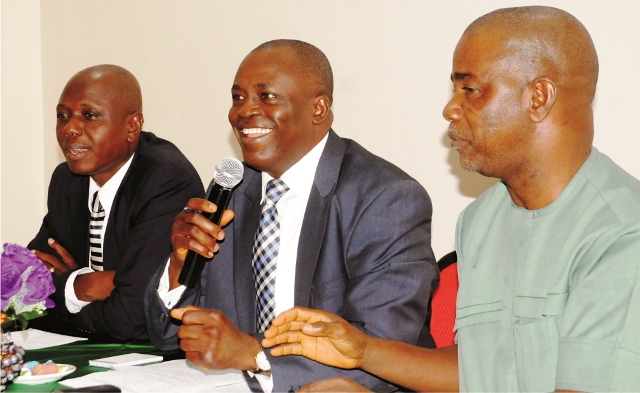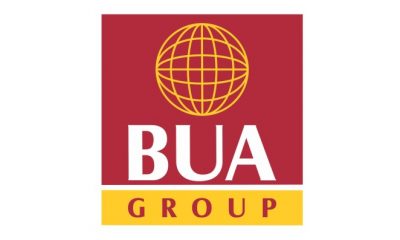Business
USAID Recommits To Power Africa Projects

The United States Consul General, John Bray and the US Agency for International Development (USAID) Mission Director for Nigeria, Michael Harvey, have restated the US Government’s commitment to join hands with other partners to develop Nigeria and Africa.
Both leaders made the pledge during a two-day visit to Edo State last week to assess the progress of partnered investments that advance US President Barack Obama’s signature initiative, Power Africa.
Bray said: “The work of bringing much more electricity to many more people in Nigeria and Africa is well underway.
“We recognise the great challenges ahead. But through Power Africa, the United States and our African partners are committed to improving lives, and energising economies,” he added.
Announced by US President Barack Obama in 2013, Power Africa is working with African governments, the private sector, and other partners to add more than 30,000 megawatts (MW) of cleaner, more efficient electricity generation capacity and 60 million new connections in sub-Saharan Africa by 2030.
During the visit, Bray and Harvey toured the construction site of Azura-Edo Independent Power Plant, a landmark 450 MW open cycle gas turbine power plant that represents Nigeria’s first new plant in over a decade.
The Tide learnt that Power Africa officials and USAID worked with the government of Nigeria and the private sector to set the power plant on a successful trajectory.
The construction of Azura-Edo Power Plant is bringing hundreds of jobs and the prospect of reliable energy to Edo State and beyond.
It was gathered that Bray and Harvey also visited Ihovbor Power Plant to assess how best Power Africa can assist.
The US officials also discussed on-going cooperation with Benin Distribution Company, as part of a two-year agreement signed in May, 2016, for Power Africa to provide consultation aimed at improving systems and infrastructure for more reliable consumer access to electricity.
While in Benin, Bray and Harvey met with Governor of Edo State, Adams Oshiomhole, and His Royal Highness, Edaiken N’Uselu, Crown Prince Eheneden Erediauwa.
Investigations show that two out of three people in sub-Saharan Africa lack access to electricity.
It would be recalled that Power Africa brings together the world’s top companies, political leaders, and financial institutions to help overcome Africa’s energy crisis.
Central to US President Barack Obama’s new model for development, Power Africa uses collective problem solving to enable African countries to pave their own energy future.
The initiative has already helped close financial transactions for production of over 4,600 MW of power transactions.
Similarly, the U.S. Agency for International Development (USAID) partners to end extreme poverty and promote resilient, democratic societies while advancing our security and prosperity.
In its partnership with Nigeria, the United States strengthens social stability through social services, supports transparent and accountable governance, promotes a more market-led economy, and enhances Nigeria’s capacity as a responsible regional and trade partner.
Josephine Atagana
Business
Eazipay Offers Zero-Interest Loans To 150,000 SMEs, Employees

With a mission to ignite growth, encourage business continuity and help businesses and employees thrive, Eazipay is gearing up to propel the dreams of 150,000 SMEs and employees to new heights through her relief fund.
Gone are the days of financial constraints and stifled dreams. With Eazipay’s support, SMEs and employees alike can bid farewell to limitations and embrace a world of endless possibilities.
Whether it’s start up, business expansion or personal development, Eazipay is here to make dreams come true.
The mind-blowing initiative, which kicked off this month, would end in December, and will also offer a range of perks and benefits designed to put a smile on the faces of SMEs and employees alike.
From exclusive discounts to various advisory services and beyond, Eazipay is committed to spreading happiness and creating lasting impact in people’s lives and to the growth of businesses.
The technology company which offers products and services that range from payroll management to IT/Device management and assessments, “Eazipay isn’t just providing financial support but also unleashing a wave of growth and prosperity for SMEs and employees across the nation.
“Interested businesses and individuals can take part in this initiative directly from the Eazipay website: www.myeazipay.com”.
Business
SMEs Critical For Sustainable Dev – Commissioner

The Commissioner of Finance, Lagos State, Abayomi Oluyomi, has described Small and medium Enterprises (SMEs) as a critical engine for sustainable development in any economy.
He said this recently at the 10th anniversary of the Alert Group Microfinance Bank and the opening of their new head office in Lagos.
According to the National Bureau of Statistics, SMEs accounted for about 50 per cent of Nigeria’s gross.
He commended the positive impact of the Alert MFB as it empowers SMEs in the State.
“Alert MFB in the past 10 years has been at the forefront of empowering SMEs in Lagos State, disbursing over N30bn in loans to over 30,000 individuals having small to medium businesses over that period, which is quite remarkable”, he said.
Speaking, the Group Managing Director of Alert Group, Dr Kazeem Olanrewaju, revealed that the financial institution commenced business in 2013 as a microfinance bank.
“We started this journey in 2013 and it has been expanding. Today, they have about 10 branches across Lagos. They have supported well over 30,000 clients and have disbursed over N30bn.
“The company has been profitable since the second year. Looking at the market and the available opportunity, the Alert MFB board decided to come together to establish a Microfinance Institute (MFI), which is the Auto Bucks Lenders”, Dr. Olanrewaju said.
The GMD further stated that the company was focused more on supporting businesses and small and medium enterprises.
“The loan to support business represents over 98 per cent. The consumer loans you will see are the ones given to entrepreneurs. So, the area of focus of Alert MFB and Auto Bucks Lenders is to support businesses across the country.
“With the establishment of Auto Bucks Lenders, we have the opportunity to also do business outside Lagos. So, presently, we have offices in Ogun State and Oyo State. We intend to go to every part of Nigeria to support what we are doing”, he declared.
Business
Retailers Explain Price Drop In Cement Cost

The cement market, in the last couple of weeks, has seen a significant turnaround with prices tumbling from between N10,000 and N15,000 per 50kg bag to between N7,000 and N8,000.
The sudden rise in the prices of cement and other major building materials in February this year upsets the construction industry, especially in real estate, where many developers were forced to abandon building sites.
A recent market survey conducted by The Tide’s source in different locations across the country confirmed a price drop, ranging between N7,000 and N7,500 per bag, though BUA cement is selling for N7,500 to N7,800 per 50kg bag, depending on location.
Both entrepreneurs and major distributors who were interviewed, explained that the price drop is due to low demand and government’s intervention.
At the peak of the price hike, the Federal Government called a meeting with major producers where it was agreed that a bag of cement should be between for N7,000 to N8,000, depending on location.
But the producers did not comply with this agreement immediately, followin which “Nigerians stopped demanding for cement; many project sites were abandoned as developers sat back and waited for the prices to come down.
“So, what has happened is an inter-play of demand and supply with price responding, which is Economics at work”, Collins Okpala, a cement dealer, told the source in Abuja.
In the Nyanya area of the Federal Capital Territory, a 50-kg bag of Dangote cement now sells for between N7,000 and N7,500, while BUA cement sells for between N8,500 and N9,500, down from between N11,000 and N12,000 respectively.
In Lagos, the product has seen significant price drop too. In Ojo area of the state, Sebastin Ovie, a dealer, told our reporter that what has happened is a crash from the January price, attributing the crash to low demand and stronger naira.
“The current price of the product is between N7,000 and N7,500 per 50kg bag, depending on the brand. This is a significant drop from the average of N12,000 which most dealers were selling in February and March”, he said.
A dealer in Agege area of the state who identified himself as Taofik Olateju, told the source that sales are picking up due to the drop in price.
He recalled that Nigerians at a point stopped buying due to the high price of the product at N15,000 per bag.
“I am sure most dealers ran at a loss then because we had mainly old stocks which we wanted to offload quickly”, he said, confirming that the product sells for between N7,500 and N8,000, depending on the brand and the demand for the brand.
Continuing, Olateju noted that “because the naira is now doing well against the dollar, it will be unreasonable for manufacturers to continue to sell the product at the old prices. I also believe that the federal government’s intervention and the threat to license more importers may have worked, leading to the reduction in price”.
In Enugu, the source reports that the product sells for between N7,200 and N7,500 depending on the brand and location.
“This is a city where the price of a 50kg bag went for as high as N12,000 and N13,000 in some cases in February and March”, Samuel Chikwendu said.
He added that the prices of other building materials, especially iron rods, have also dropped considerably which is why, he said, activities are picking up again at construction sites.
The story is slightly different in Owerri, the capital of Imo State, where Innocent Okonkwo told the source that low demand was also driving the price drop, adding that a 50kg bag was selling for N9,000 on the average in the state.
Sundry market observers are optimistic of further price reductions, but they remain cautious as manufacturers, wholesalers, and retailers continue to play critical roles in setting prices for end-users.
They lamented, however, that despite Nigeria’s status as one of the largest producers of cement in Africa, the price of the product continues to rise, particularly in the face of high inflation impacting the building materials market generally.
Okpala in Abuja highlighted the variations arising from direct sourcing from manufacturers versus procurement through dealers, with traders holding old stocks selling products at prices ranging from N8,500, N8,300 to N8,000 per bag.
Lucy Nwachukwu, another dealer in Abuja, said the significance of procurement volume in determining cement costs, noting that stability in prices has been observed over the past month, with the product retailing for between N7,000 and N7,800 depending on the brand.
In Port Harcourt also, a customer, Daniel Etteobong Effiong, said the price goes between N7500 to N8500, depending on the brand and the location one is buying from.
-

 Politics5 days ago
Politics5 days agoLG Chairman-Elect Blames Insecurity On Parental Failure
-

 Rivers5 days ago
Rivers5 days agoRIMA Set To Disburse Loan To Over 500 Small Businesses In Rivers
-
Niger Delta18 hours ago
PIA: Bayelsa Ready For Littoral Communities’ Mapping Exercise
-

 Business17 hours ago
Business17 hours agoRetailers Explain Price Drop In Cement Cost
-
Sports5 days ago
Expert Wants Parents To Enroll Children In Vector Programme
-
News19 hours ago
Nigerians Decry New Subscription Rates For DSTV, Gotv
-
Politics17 hours ago
APC Stakeholders Storm Secretariat, Demand Ganduje’s Resignation
-
Sports16 hours ago
NFF President Backs Falcons To Shine At Olympics

